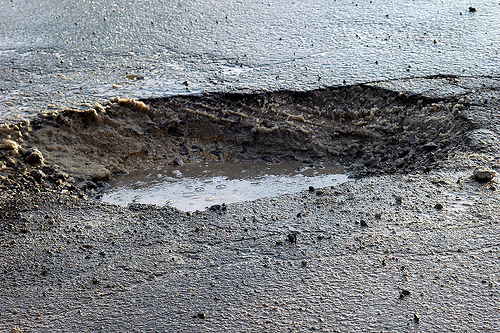
KIRKUK, Iraq — The recently refurbished tarmac at Maine’s busiest airport contains the usual mixture of gravel, water and chemical binder, but what gives this asphalt its jet-black color is crude oil supplied by the Islamic State group. The Portland International Jetport’s new pavement isn’t the only blacktop of its kind on American soil. Four hundred miles south, highways outside Philadelphia are lined with the same mixture, as are hundreds of potholes on the streets of New York City, a four-month-long International Business Times investigation found.
These are but a few of the many places where ISIS’ oil ends up as part of an illicit business that helps fund the group’s reign of terror, according to Kurdish officials and local police documents. Part of what makes the Islamic State group, known as ISIS, so difficult to defeat is its diverse revenue stream. The Sunni militant group draws income from taxes it levies on the people in conquered lands, kidnapping ransoms and other forms of extortion. But it also makes money to fuel attacks like the ones in Brussels last week by selling a steady stream of oil that flows from ISIS-controlled territories in Iraq to the U.S., parts of Europe and Israel. It’s a constant source of money — as much as $1 million per day at its height — that U.S. and Iraqi officials have failed to halt.
In the aftermath of the Belgium attacks, U.S. President Barack Obama said his priority is defeating ISIS. “There’s no more important item on my agenda than going after them and defeating them. The issue is, how do we do it in an intelligent way,” Obama said at a press conference following the attack last Wednesday. But the U.S. administration, though it has pursued a strategy of striking ISIS’ oil supply centers and mobile refineries, has not choked off the group’s oil reserves completely. It has not hit the pipeline that the terrorist group uses to export its oil or the major roads that serve as trading routes.
The story of how the Islamic State group profits from crude that makes its way to refineries and storage facilities around the world begins in the central Iraq town of Kirkuk. Here, on the main dusty road that leads into the city, black smoke billows in the distance. Refineries are busy readying hundreds of thousands of barrels of crude for transport to ports in Turkey. Kirkuk’s streets bustle with local markets, where men, women and children buy food to prepare dinner. It’s a lively town despite the frequent car bomb attacks launched by Islamic militants.
By International Business Times, SouthFloridaReporter.com, Mar. 30, 2016
[/vc_message]











